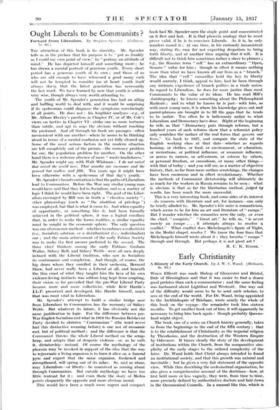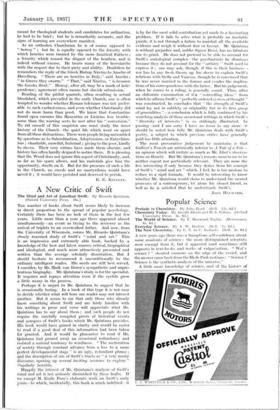Early Christianity
WHEN Ellicott was made Bishop of Gloucester and Bristol, Dale of Birmingham said that it was easier to find a dozen good prelates than such a commentator ; and the same feeling was harboured about Lightfoot and Westcott. One way out of the difficulty would seem to be to send such scholars to sees at the end of the world. For Dr. Wand, being appointed to the Archbishopric of Brisbane, wrote nearly the whole of this book on the voyage—the remainder took him sixteen months. To get another book out of him, it will apparently be necessary to bring him back again : though probably Queens- land might object.
The book, one of a series on Church history generally, takes Os from the beginnings to the end of the fifth century ; that is to the establishment of Christianity as the imperial religion by Theodosius, and the destruction of the Western Empire by Odovacer. It traces clearly the story of the development of institutions within the Church, from the comparative sim- plicity of the early stages to the ordered complexity of the later. Dr. Wand holds that Christ always intended to found an institutional society, and that this growth was natural and inevitable ; but he gives a very fair statement of the opposite view. While thus describing the ecclesiastical organisation, he also gives a comprehensive account of the doctrines—how, at first held more or less vaguely, they were, from time to time, more precisely defined by authoritative doctors and laid down in the Oecumenical Councils. In a manual like this, which is Meant for theological students and candidates for ordination, he had to be brief ; but he is remarkably accurate, and the signs of learning are everywhere manifest.
' As an orthodox Churchman he is of course opposed to
heresy " ; but he is equally opposed to the ferocity with which heretics were treated by the more fanatical Fathers ; a ferocity which roused the disgust of the heathen, and is indeed without excuse. He treats many of the heresiarchs with the respect due to their piety and. ability. Doubtlegs he remembers the reply of the Greek Bishop Nicetas to Anselm of Havelberg. ".There are no heretics in Italy," said Anselm ; " in Greece they swarm." That," said Nicetas, " is because the Greeks think." Heresy, after all, may be a mark of inde- pendence; agreement often means but slavish submission.
Reading of the pitiful quarrels, often resulting in actual bloodshed, which prevailed in the early Church; one is often tempted to wonder whether Roman tolerance was not prefer- able to such exclusiveness, and even whether Christianity did not do more harm than good. We know that 'Constantine found open enemies like Maxentius or Licinius less trouble- some than the warring sects he met after his " conversion." To rid oneself of this suspicion one must study the inner history of the Church—the quiet life which went on apart from all these distractions. There were people living untroubled by questions as to Subordination, Adoptionism, or Eutychian- ism ; charitable, merciful, fraternal ; giving to the poor, kindly to slaves. Their very virtues have made them obscure, and history has often hardly deigned to notice them. It is pleasing that Dr. Wand does not ignore this aspect of Christianity, and, as far as his space allows, and his materials give him the opportunity, dwells on it. But for the presence of such a life in the Church, no creeds and no martyrdoms would have saved it ; it would have perished and deserved to perish.
E. E. KELLETT.











































 Previous page
Previous page